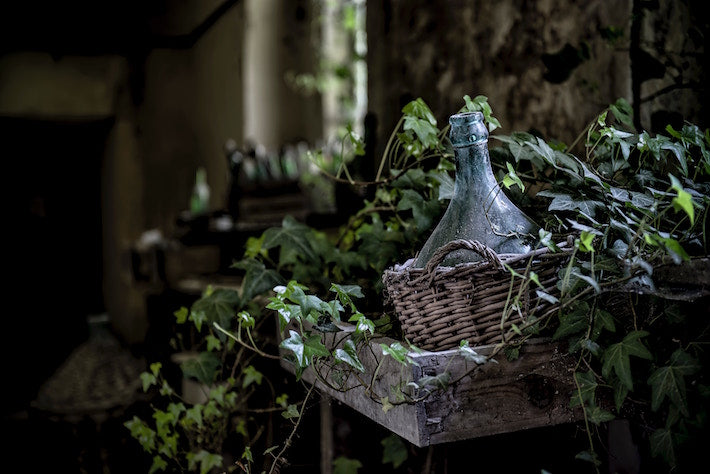A Complete History of Wine Storage

Have you ever wondered why wine is stored in cellars and antique wine racks? Or why corks are used? Today we're looking at the history of wine storage! We'll explore the five golden rules of wine storage, as well as the different storage vessels and antique wine racks used over time.
The Golden Rules of Wine Storage
To begin with, here are the five objectives of optimum wine storage:
- Keep air out of the vessel - this will limit the wine's oxidation and keep the wine for longer.
- The vessel must be strong, but not too heavy.
- The vessel seal must allow for opening and closing.
- The vessel should positively impact the wine's flavor and tannins.
- Wine should be stored in a cool, stable temperature.

Photo by: Scott Warman
'Amphorae' in the Bronze Age: Antique Wine Racks
Our journey of wine storage starts in the Bronze Age with large clay vessels called amphorae. These wax-lined, ceramic containers were invented by the Egyptians and used to transport wine, olive oil, and other precious liquids. The vases were long and tapered with handles at the top. To carry the vessels, rope was strung through the handles. For storage, they were buried into the sand and they had special stands for indoor use. They were originally sealed with clay toppers, but it was discovered that this let in too much oxygen. So, the Greeks and Romans experimented with sealing the vessels with rags, wax, and cork. This was the beginning of the cork wine stopper.

Image: Antikythera
The Advent of Wood Barrels: Antique Wine Racks
As the Roman empire expanded to Gaul (modern-day France) in 50 BC, the Romans were surprised to see the Gauls storing their beer in wooden barrels. However, when they realized how much lighter, stronger and more portable the barrels were, they also adopted them. By the third century, virtually all merchants were using wine barrels.

Photo by: Arnold Dogelis
The Impact of Oak Barrels on Wine
Oak was used for the barrels because oak trees were abundant, easy to bend and oak wood has a tight grain, which makes the barrels watertight. Over time, winemakers and drinkers discovered the positive impact that oak has on wine's flavor. It was a lucky, accidental discovery.
Wine Storage in Glass Bottles
Wine continued to be stored and shipped in barrels well into the twentieth century. Glass is a relative newcomer on the scene. In the 1700s and early 1800s, large, globe-like bottles started to be used in Europe. These are called “demijohns,” or damigiana in Italian. These antique glass wine bottles were handblown and encased in hand-woven wicker, or wooden baskets and crates to protect the glass. They now make for lovely decor accent pieces. We have a beautiful selection of demijohns in store.

Photo by oldskool photography
The Transition to Standardized Glass Bottles
In 1821, a company called Rickets of Bristol patented a machine that could standardize the size of glass bottles. This was the beginnings of the 750ml wine bottle we see today. Like all wine vessels, these bottles required stoppers. The cork stoppers experimented with by the ancient Romans proved to be the answer.
Wine Cellars: Antique Wine Racks
Historically wine was made for immediate consumption, but through trade, it was discovered that fluctuations in humidity and temperature 'cook' the wine. Wealthy wine producers and merchants began to store their wine in cellars below the ground. In the 18th century, people began storing their glass wine bottles in specially designed wine cellars. Wine cellars with antique wine racks remain the best solution for wine storage today.

Photo by: Nick Karvounis
Antique Wine Racks
Wine is best stored sideways so that the cork stays moist and does not dry out. A dry cork will let air inside and this oxidizes the wine. If you don't have a wine cellar you can use an antique wine rack. Wine racks hold bottles sideways and also serve as lovely decor elements. A champagne riddling rack would be a great statement piece for wine storage. Developed in the early 1800's, they were historically used for making sparkling wine in the méthode traditionelle.
Next →
← Previous

